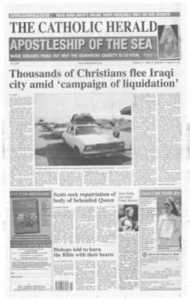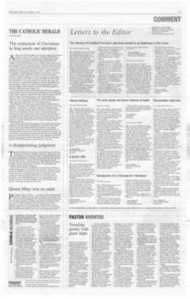Page 10, 17th October 2008
Page 10

Report an error
Noticed an error on this page?If you've noticed an error in this article please click here to report it.
Tags
Share
Related articles
Vote For The Common Good
The Guild's Meaning
Thank Heavens We Don't Have A 'religious Right'
'captivity
Conservatism A Perfectly Egthmate Way Of Building The New...
Amid crumbling markets, the role of the state is clear
It's time for serious government. But we, too, have a duty to engage with politics, says Jill Segger
4 T here are needs and common goods that cannot be satisfied by the market system. It is the task of the state and of all society to defend them. An idolatry of the market alone cannot do all that should be done." These words from Pope John Paul's 1991 encyclical Centesimus Annus should be emblazoned in letters 10 feet tall wherever economic and political decisions are taken. They should also be in the hearts of all Christians and people of goodwill. In these weeks of mounting economic anxiety, it is easy to overlook the call to duty embedded in John Paul's words: the task belongs not only to the state but to all of society. That includes you and me.
The party conference season is over and the leaders' speeches have been consigned to the recycling bin. But as the banking system implodes under the weight of unregulated greed, making economic and social breakdown a real possibility, the role of governments and the stance of politicians is suddenly centre-stage. This is a good time to look at some aspects of the speeches made by party leaders; to ask not just what their perorations reveal about their political ethos, but what part do we, as privileged citizens of a democracy, play in creating the culture in which our elected representatives must display their wares and sell their personalities.
Third parties without hope of power characteristically resort to the stance of "a plague on both your houses". Lack of accountability may be liberating. but fantasy politics attracts lightweights. Liberal Democrat leader Nick Clegg offered little more than motherhood-andapple-pie combined with a posturing that will remain untested by the realities of governance. Speaking before economic meltdown had made gravitas and experience the new gold standard for politicians, Mr Clegg strode around the conference stage, depending upon a hidden autocue to give the impression of spontaneity. The intention was presumably to present himself and the policies of his party as informal, vigorous and fresh. The reality was distracting, theatrical and affected. His delivery was melodramatic and the content dependent upon anecdote. To groan at such frequent references as "Angie, the middleaged mum" and "Joan, the pensioner" is not to dismiss the difficulties these people may experience, but rather to deplore the folksy substitution of voter archetypes for intelligent policy formulation. Required by PR gurus to be demotic and energetic, Mr Clegg displayed all that is shallow and demeaning in modern political discourse: the triumph of style over substance. It gained him a standing ovation.
When Gordon Brown stood before the Labour faithful in Manchester a week later, his situation could not have been more different. The Prime Minister faced an unfolding crisis, mounting unpopularity within his own party and an electorate disinclined to question unremitting media hostility towards the Government.
Gordon Brown is not a natural orator. His mannerisms the strange jaw-drop and the two-handed chopping gesture are easily parodied. His tendency to fire out economic statistics alienates listeners and can appear evasive. But the characteristics of an awkward man uninterested in image have the potential to appeal to a public tiring of slick presentation. As straplines go "not flash, just Gordon" is not bad.
The speech was better than might have been expected. The delivery had been slowed, the pauses were well judged and the Prime Minister managed to sound like a human being. The old tropes emerged occasionally hard-working families and opportunity for all are never far from his tongue but there was at fast recognition of what Labour MP Jon Cruddas has called "the need to re-calibrate our language".
Standing behind a lectern and emphasising that serious times require a serious man, Mr Brown struck a note of solidity and competence as he pledged to address the economic crisis and defend people under financial pressure. The intention to curb perhaps belatedly the excesses of bankers has been proved in the last few days to be more than conference-pleasing rhetoric. Among the stock generalisations on freedom, responsibility and punishing those who do not "play by the rules", there were clear pledges of action which can only be made by a politician in power. He took the attack to the Tories with hard figures on their public spending commitments a strategy which reaches outside the conference arena to prompt serious debate on matters which will affect the lives of all citizens. The only sound-bite the Prime Minister permitted himself was the "no time for novices" jibe. It was effective. The leader of the opposition felt it necessary to'spend much of his speech trying to refute the implication. Debate depends upon clear delineation of difference and the sting which draws blood may serve democracy well.
David Cameron is the most assured speaker among the three party leaders. His style is fluent and well-paced. Of course, there is artifice: the tightly drawn lips with which he seeks to emphasise the seriousness of a particular phrase and add strength to a rather weak face is irritating but understandable. Relentless close-up exposure by the media can damage a politician: we might question our complicity with the misdirected scrutiny that makes such ruses appear necessary.
Mr Cameron spent too much of his speech dealing with the Prime Minister's "novicetaunt. His arguments smacked of the junior common room and one can only regret that puerile streak in our political culture which made him feel that logic chopping offered a better response than a confident display of political competence. Despite some brave attempts to move his party in a more socially compassionate direction. there was a deficit at the heart of Mr Cameron's speech. It was his inability to rise to the challenge of offering find policies and backing them with sound costings. In its place were repeated references to "character" and "judgment". David Cameron may well possess these important virtues, but neither is sufficient without the coherent policies which grow from a vision of the decent society.
G K Chesterton warned of the "easy speeches that comfort cruel men". Setpiece political speeches are ''easy" when they are contrived from expediency and not hewn out of conviction. A lot is expected from leaders' speeches they must gee up the troops, make the top of the news bulletins and reach the wider electorate. And the wider electorate can be very cruel indeed. Few people listen carefully or read the texts with an analytical and realistic eye. Fewer still acknowledge the part that their own acceptance of the prevailing cynicism plays in the tone and style of those speeches.
. As the world's markets teeter on the brink of collapse, the role of the state has never been clearer. In intervening to save the very fabric of our social structures, government has answered those who call for it to become ever smaller. The politicians we so readily deride are called on to show vision and leadership. The duty of the Christian citizen is equally plain: to play a responsible role, not only in financial ethics but in an informed, morally mature engagement with the political process.
blog comments powered by Disqus

















